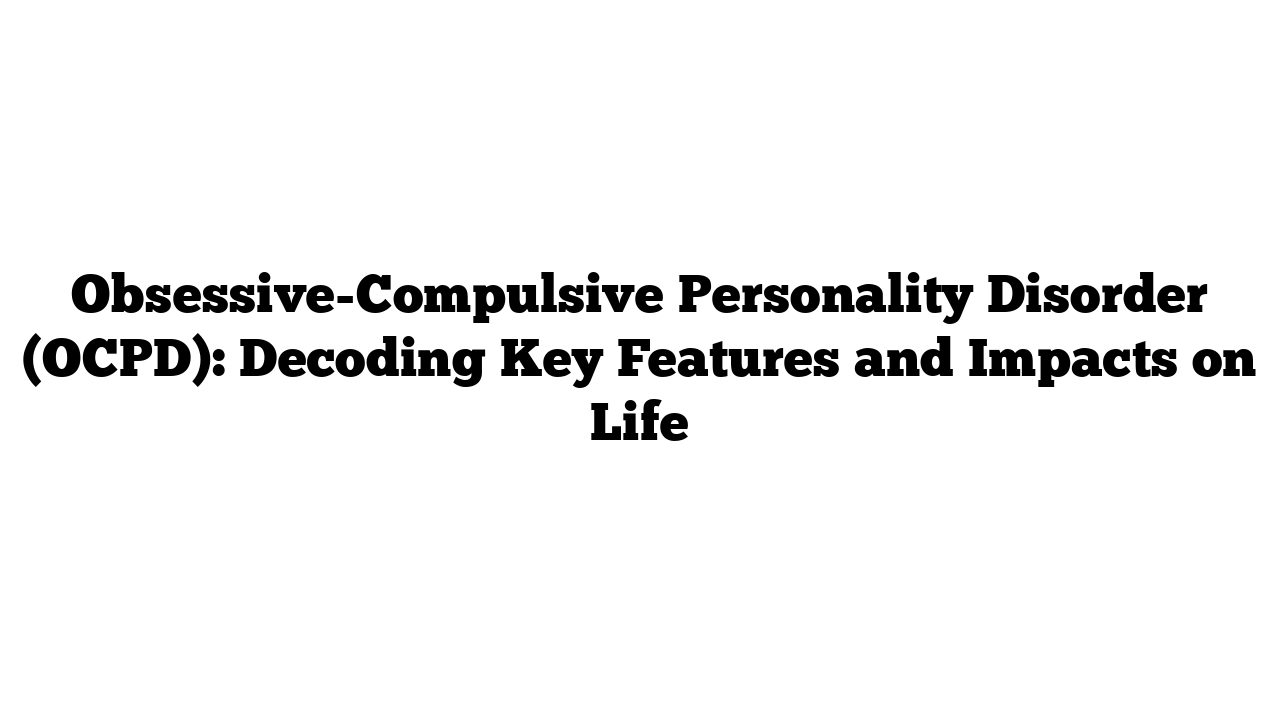Obsessive-Compulsive Personality Disorder (OCPD) is a condition that affects multiple areas of life. This article draws from expert insights by Dr. Romani to explain the unique criteria that mental health professionals use to diagnose OCPD, based on guidelines in the DSM (Diagnostic and Statistical Manual of Mental Disorders) and the ICD (International Classification of Diseases).
Understanding the DSM and ICD
The DSM, developed by the American Psychiatric Association, is a standard diagnostic tool that lists symptoms required to diagnose various mental disorders, including personality disorders like OCPD. Updated periodically to reflect the latest research, the DSM provides a framework that guides mental health professionals in evaluating whether a person meets the criteria for a disorder.
The ICD, managed by the World Health Organization, serves a similar role globally and aligns closely with the DSM on mental health diagnoses. Health insurers often rely on ICD codes for claims, which is why you may see these codes on medical statements. Both tools represent years of research and are subject to continuous evolution.
Core Areas Affected by OCPD
OCPD manifests in distinct ways that impact two core areas of life: self-functioning and interpersonal relationships. Within these areas, specific impairments are observed, often leading to challenges in personal identity, goal orientation, empathy, and intimacy.
- Identity and Goal Orientation
- Individuals with OCPD often link their identity to productivity and achievements, prioritizing work or organization over personal well-being.
- Their goals are frequently shaped by work achievements and productivity, with little focus on balance or happiness, often to the exclusion of social or family life.
- Interpersonal Functioning
- In interpersonal relationships, people with OCPD may display restricted empathy, often due to their rigid, rule-bound worldview.
- Intimacy can also be affected; work commitments usually take precedence over personal relationships, making it challenging for them to connect deeply with others.
Key Traits and Behaviors in OCPD
The DSM outlines specific traits that characterize OCPD. Dr. Romani elaborates on each of these in detail, illustrating how these behaviors impact the lives of those with OCPD:
- Preoccupation with Order and Details
- OCPD individuals may be excessively focused on lists, organization, and details to the point of losing sight of the task’s purpose. For instance, they may spend hours on color-coded filing systems, often delaying the actual task.
- Perfectionism
- Their perfectionism can be counterproductive, causing delays or missed deadlines. A school project or work report may go unfinished as they strive for a level of flawlessness that hinders completion.
- Excessive Devotion to Work
- People with OCPD often work long hours and weekends unnecessarily, which can strain their social life and relationships. Unlike those working out of necessity, OCPD individuals do so out of compulsion, with little regard for their personal needs.
- Over-Conscientiousness with Morality and Rules
- They adhere rigidly to their personal moral codes, often viewing minor deviations as serious transgressions. For example, they might view sharing food at a buffet as “stealing,” which creates stress in everyday social situations.
- Inability to Discard Worthless Objects
- While not as extreme as hoarding, individuals with OCPD may keep old items (e.g., clothes, tools) out of a sense of potential usefulness, leading to an organized, yet cluttered, environment.
- Reluctance to Delegate
- OCPD individuals rarely delegate tasks, believing others cannot meet their high standards. This tendency to “do it all” often results in inefficiency, as they take on more than they can manage effectively.
- Miserliness
- A defining trait of OCPD is an intense frugality, often extending to themselves. They may hold onto money or resources excessively, refusing to spend even on reasonable needs. This behavior reflects both a desire for control and an underlying anxiety about future security.
- Rigid Control Over Money and Resources
- Money often symbolizes control for people with OCPD. This can lead to uncomfortable dynamics in relationships, where they may hesitate to help family members financially, even if it causes strain.
Conclusion: Living with and Supporting Those with OCPD
OCPD is more than a need for order—it reflects a worldview focused on control, productivity, and structure, often to the detriment of personal and social well-being. By understanding these characteristics, family and friends can approach their loved ones with empathy, encouraging treatment options like cognitive-behavioral therapy (CBT) that may offer help in managing OCPD’s impacts.
